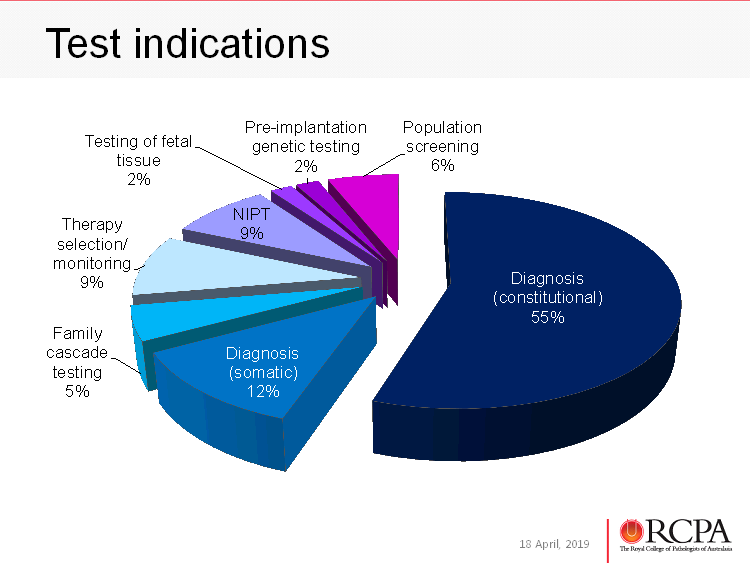The post From science fiction to science fact: the rise and rise of genetic testing first appeared on Know Pathology Know Healthcare.
]]>Genetic testing refers to specific genes or parts of genes and how those characteristics are passed through generations via DNA. Genomics refers to the entirety of an organism’s genes and analysing vast amounts of DNA data to find variations that impact health, disease, or drug response. Genomics in medicine can also refer to testing all the genes known to be related to a specific disorder e.g. all the genes known to cause intellectual disability or breast cancer.
The report found a 73% increase in molecular test requests over the past 5 ½ years, with more than 660,000 genetic or genomic tests reported during the 2016/2017 financial year.
More than 660,000 genetic/genomic tests were reported over the one-year survey period, which ran during the 2016/2017 financial year.
The field of genetics/genomics is exploring exciting new areas, such as pharmacogenetics – which allows a clinician to look at an individual’s genetic make-up and metabolism in order to prescribe the ideal drug and dosage.
People had genetic tests for a number of reasons, including cancer diagnosis and treatment, looking for inheritable genetic conditions, transplant monitoring, and prenatal screening.
It is also possible through genetic testing to determine which patients will and which won’t respond to a medicine, helping refine and personalise the treatment and to save significant amounts of money on expensive medicines that may not work.
Dr Melody Caramins, a genetic pathologist, explains that the developments in genetic medicine are both a boon to the healthcare sector and a challenge.

While promising a radical improvement in the way we treat patients, the genetics/genomics revolution is also presenting challenges to the medical field.
‘The development of genetic technology has been swift but because it’s moving so rapidly there’s a risk of clinicians not being up to date.
‘That puts a premium on the medical and pathology workforce to help upskill requesting doctors and to integrate these technologies into mainstream healthcare, because the benefits of using these tests responsibly can potentially be enormous.’
The RCPA data shows that GPs were the most frequent users of genomic testing, along with obstetricians, fertility, and foetal medicine specialists: this grouping was responsible for ordering half of the genetic and genomic tests conducted over the last 12 months.
Another way in which genetic/genomic testing is throwing forward challenges is in their funding, although that too has increased in recent years.
‘In 2011, Medicare funding covered about 35% of genetic tests. In the 2016/2017 period that figure rose to 49% of tests being covered by Medicare,’ said Dr Caramins.
‘That increase reflects both the increase in the number of tests being taken as well as the increase in the variety of tests being covered by the Medicare Benefit Schedule.’
The post From science fiction to science fact: the rise and rise of genetic testing first appeared on Know Pathology Know Healthcare.
]]>The post Australian scientist in new global genomic search for cancer cures first appeared on Know Pathology Know Healthcare.
]]>The International Cancer Genome Consortium for Medicine (ICGCMed) will sequence the genes of 200,000 people with cancer to accelerate advances in cancer treatments.
Dr Nik Zeps is a Perth-based cancer researcher with a passion for translating complex scientific breakthroughs into practical uses that benefit patients. He’s playing several roles in the new project including sitting on the ethical, scientific planning and communications committees.
The project will record non-genetic patient information including details from the pathology report at diagnosis, response to treatments, survival information and patient demographics as well as lifestyle and environmental factors known to influence cancer risk.
This information will be cross-referenced with the genomic data collected. By doing this, the ICGCMed team will identify which genetic changes result in aggressive cancers, and which result in non-threatening or benign tumours. This helps doctors and patients make better treatment choices sooner after diagnosis. Dr Zeps says,
“Australia has a proud tradition of innovation in pathology and medical research and three Australian projects have already been run locally for ICGC in pancreatic and ovarian cancer and in Melanoma. ICGCMed projects will extend that work and could improve cancer prevention and treatment for Australians over the next 10 to 20 years.”
One of the most immediate benefits for patients and researchers will be to simplify clinical trial recruitment, fueling faster discoveries.
Finding cancer patients that meet strict criteria for clinical trials of new drugs and treatments is time consuming. By having such detailed information on hand, potential trial participants can be identified faster, reducing the time needed to complete studies.
Within nine years scientists hope to identify risk factors for specific cancers; develop successful cancer prevention strategies; create new tests for earlier, faster diagnosis and better match treatments with cancer types and lifestyle/environmental factors.
Dr Zeps was an investigator on a previous ICGC project based in Australia that sequenced 461 Australian men and women with pancreatic cancer – a disease with one of the worst survival rates worldwide. The information gained from that study is already being used to improve treatment for pancreatic cancer. He says;
“Input from pathology laboratories is vital to the success of the ICGCMed projects. Pathology teams provide the biopsy samples that are sequenced, detailed genomic and non-genomic information about the cancers, inform us when relapses occur, and help monitor each individual’s response to new trial treatments.”
The ability to sequence entire genomes at an affordable price has made large-scale projects such as ICGCMed possible. The Human Genome Project from 1990-2003 was the first time scientists mapped all the genes in a human body. It took 20 international research institutes and nearly USD $3 billion. Now this information can be sequenced within a few days for around USD $3,000 onto a computer chip the size of an adult’s hand.
The post Australian scientist in new global genomic search for cancer cures first appeared on Know Pathology Know Healthcare.
]]>